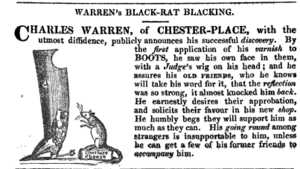Charles Warren (MP) facts for kids
Charles Warren (born March 19, 1764 – died August 12, 1829) was an English lawyer, politician, judge, and a keen amateur cricket player. He had an interesting career that combined law, government, and sports.
Life and Education
Charles Warren came from a well-known family. His uncle was John Warren, a bishop, and his brother was Pelham Warren, a doctor. Charles went to Westminster School and then studied at Jesus College, Cambridge. He started college in 1780 and earned his first degree in 1785. He became a Fellow at Jesus College, which is like being a senior member of the college, from 1786 to 1813.
In 1781, he began his legal training at Lincoln's Inn, a famous place for lawyers in London. He officially became a barrister (a type of lawyer) in 1790. In the same year, he was also chosen to be a Fellow of the Royal Society, which is a group that promotes science.
In 1792, Charles Warren signed a statement from a group called the Society of the Friends of the People. This group supported changes in how the government worked.
Legal Career
Charles Warren worked as a barrister at the Old Bailey, a famous court in London. He also handled cases related to bankruptcy. From 1797 until he died, he was the chancellor for the diocese of Bangor, which meant he was a legal advisor for the church area.
In 1816, he was made a King's Counsel, a special title for experienced lawyers. In 1819, he became the Chief Justice of Chester. This was a very important job as a judge. He was the last person to hold this position before it was removed by a new law in 1830. In 1820, he was the main judge in a trial about sedition, which is when someone tries to encourage people to go against the government.
Political Career
Even though he was a judge, Charles Warren also served as a Member of Parliament (MP) for Dorchester. In England, judges usually couldn't be MPs, but the rules were different for judges in Wales. This was a topic of debate in Parliament at the time.
He was supported by Cropley Ashley-Cooper, 6th Earl of Shaftesbury, who was a strong supporter of the Tory government led by Lord Liverpool. Charles Warren was not challenged in the election of 1820. He decided to retire from Parliament in the election of 1826.
Legacy
After Charles Warren passed away, his legal papers from the Chester Circuit were sent to the Public Record Office in 1847. These papers contained important historical information about the legal system.
Family
Charles Warren married Amelia Sloper on July 9, 1813. Their wedding took place in London.
Cricket
Charles Warren was a very enthusiastic amateur cricketer. He mostly played for Middlesex teams. He was part of the very first Gentlemen v Players match in 1806, which was a famous game between amateur and professional cricketers. He played in 33 known first-class cricket matches between 1795 and 1826.
Along with another player named John Tanner, Charles Warren was one of the last cricketers from the 1700s to stop playing first-class cricket. He played until he was 62 years old.
 | Valerie Thomas |
 | Frederick McKinley Jones |
 | George Edward Alcorn Jr. |
 | Thomas Mensah |


